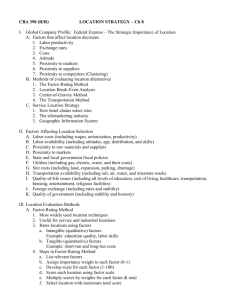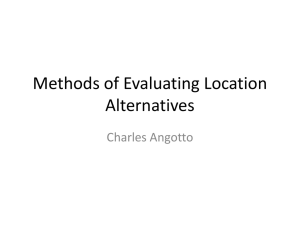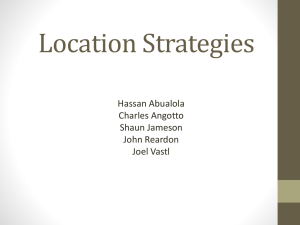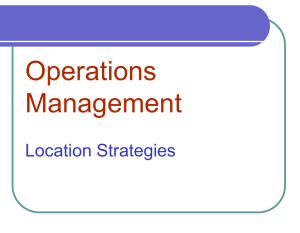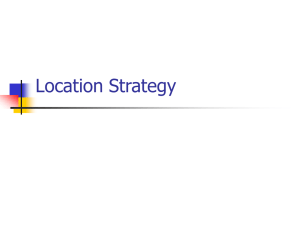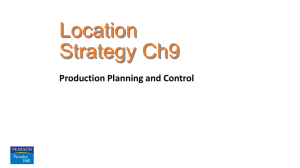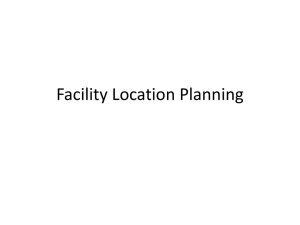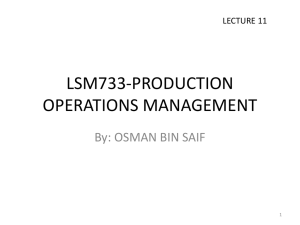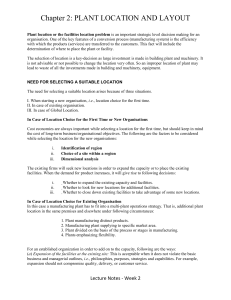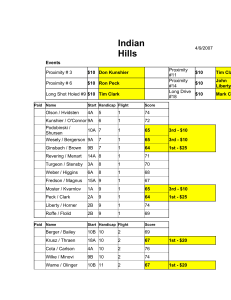Location Strategies
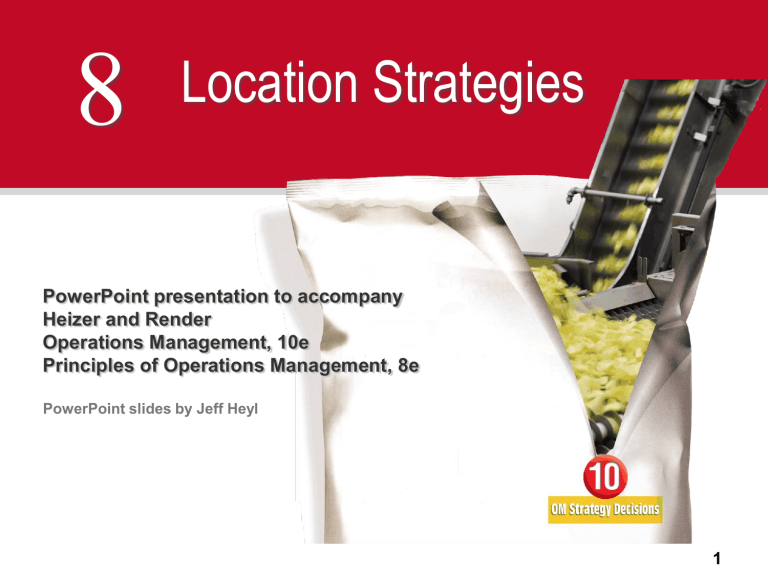
8
Location Strategies
PowerPoint presentation to accompany
Heizer and Render
Operations Management, 10e
Principles of Operations Management, 8e
PowerPoint slides by Jeff Heyl
1
Outline
The Strategic Importance of Location
Factors That Affect Location Decisions
Labor Productivity
Exchange Rates and Currency Risks
Costs
Political Risk, Values, and Culture
Proximity to Markets
Proximity to Suppliers
Proximity to Competitors (Clustering)
Methods of Evaluating Location Alternatives
The Factor-Rating Method
Locational Break-Even Analysis
Service Location Strategy
2
Learning Objectives
1.
Identify and explain seven major factors that effect location decisions
2.
Apply the factor-rating method
3.
Complete a locational break-even analysis graphically and mathematically
4.
Understand the differences between service and industrial-sector location strategies
3
Federal Express
Central hub concept
Enables service to more locations with fewer aircraft
Enables matching of aircraft flights with package loads
Reduces mishandling and delay in transit because there is total control of packages from pickup to delivery
4
Location Strategy
One of the most important decisions a firm makes
Increasingly global in nature
Significant impact on fixed and variable costs
Decisions made relatively infrequently
The objective is to maximize the benefit of location to the firm
5
Location and Costs
Location decisions based on low cost require careful consideration
Once in place, location-related costs are fixed in place and difficult to reduce
Determining optimal facility location is a good investment
6
Location Decisions
Long-term decisions
Decisions made infrequently
Decision greatly affects both fixed and variable costs
Once committed to a location, many resource and cost issues are difficult to change
7
Location Decisions
Country Decision Key Success Factors
Figure 8.1
1.
Political risks, government rules, attitudes, incentives
2.
Cultural and economic issues
3.
Location of markets
4.
Labor talent, attitudes, productivity, costs
5.
Availability of supplies, communications, energy
6.
Exchange rates and currency risks
8
MN
Figure 8.1
WI
Location Decisions
Region/
Community
Decision
IL IN
MI
OH
Key Success Factors
1.
Corporate desires
2.
Attractiveness of region
3.
Labor availability and costs
4.
Costs and availability of utilities
5.
Environmental regulations
6.
Government incentives and fiscal policies
7.
Proximity to raw materials and customers
8.
Land/construction costs
9
Location Decisions
Site Decision Key Success Factors
1.
Site size and cost
2.
Air, rail, highway, and waterway systems
3.
Zoning restrictions
4.
Proximity of services/ supplies needed
5.
Environmental impact issues
Figure 8.1
10
Factors That Affect
Location Decisions
Labor productivity
Wage rates are not the only cost
Lower productivity may increase total cost
Labor cost per day
Productivity (units per day)
= Cost per unit
Connecticut
$70
60 units
= $1.17 per unit
Juarez
$25
20 units
= $1.25 per unit
11
Factors That Affect
Location Decisions
Exchange rates and currency risks
Can have a significant impact on costs
Rates change over time
Costs
Tangible - easily measured costs such as utilities, labor, materials, taxes
Intangible - less easy to quantify and include education, public transportation, community, quality-of-life
12
Factors That Affect
Location Decisions
Political risk, values, and culture
National, state, local governments attitudes toward private and intellectual property, zoning, pollution, employment stability may be in flux
Worker attitudes towards turnover, unions, absenteeism
Globally cultures have different attitudes towards punctuality, legal, and ethical issues
13
Factors That Affect
Location Decisions
Proximity to markets
Very important to services
JIT systems or high transportation costs may make it important to manufacturers
Proximity to suppliers
Perishable goods, high transportation costs, bulky products
14
Factors That Affect
Location Decisions
Proximity to competitors
Called clustering
Often driven by resources such as natural, information, capital, talent
Found in both manufacturing and service industries
15
Factor-Rating Method
Popular because a wide variety of factors can be included in the analysis
Six steps in the method
1.
Develop a list of relevant factors called key success factors
2.
Assign a weight to each factor
3.
Develop a scale for each factor
4.
Score each location for each factor
5.
Multiply score by weights for each factor for each location
6.
Recommend the location with the highest point score
16
Factor-Rating Example
Key
Success
Factor
Labor availability and attitude
People-tocar ratio
Per capita income
Tax structure
Education and health
Scores
(out of 100)
Weight France Denmark
.25
.05
.10
.39
.21
70
50
85
75
60
60
60
80
70
70
Weighted Scores
France Denmark
(.25)(70) = 17.5
(.05)(50) = 2.5
(.10)(85) = 8.5
(.39)(75) = 29.3
(.21)(60) = 12.6
(.25)(60) = 15.0
(.05)(60) = 3.0
(.10)(80) = 8.0
(.39)(70) = 27.3
(.21)(70) = 14.7
Totals 1.00
70.4
68.0
Table 8.4
17
Locational
Break-Even Analysis
Method of cost-volume analysis used for industrial locations
Three steps in the method
1.
Determine fixed and variable costs for each location
2.
Plot the cost for each location
3.
Select location with lowest total cost for expected production volume
18
Locational Break-Even
Analysis Example
Three locations:
Selling price = $120
Expected volume = 2,000 units
City
Akron
Fixed Variable Total
Cost Cost Cost
$30,000 $75 $180,000
Bowling Green $60,000 $45 $150,000
Chicago $110,000 $25 $160,000
Total Cost = Fixed Cost + (Variable Cost x Volume)
19
Locational Break-Even
Analysis Example
Figure 8.2
–
$180,000 –
–
$160,000 –
$150,000 –
–
$130,000 –
–
$110,000 –
–
–
$80,000 –
–
$60,000 –
–
–
$30,000 –
–
$10,000 –
| –
0
Akron lowest cost
|
500
Bowling Green lowest cost
Chicago lowest cost
| | | | |
1,000 1,500 2,000 2,500 3,000
Volume
20
Service Location Strategy
1.
Purchasing power of customer-drawing area
2.
Service and image compatibility with demographics of the customer-drawing area
3.
Competition in the area
4.
Quality of the competition
5.
Uniqueness of the firm’s and competitors’ locations
6.
Physical qualities of facilities and neighboring businesses
7.
Operating policies of the firm
8.
Quality of management
21
How Hotel Chains Select Sites
Location is a strategically important decision in the hospitality industry
La Quinta started with 35 independent variables and worked to refine a regression model to predict profitability
The final model had only four variables
Price of the inn
Median income levels
State population per inn
Location of nearby colleges r 2 = .51
51% of the profitability is predicted by just these four variables!
22
The Call Center Industry
Requires neither face-to-face contact nor movement of materials
Has very broad location options
Traditional variables are no longer relevant
Cost and availability of labor may drive location decisions
23
In-Class Problems from the
Lecture Guide Practice Problems
Problem 1:
A major drug store chain wishes to build a new warehouse to serve the whole
Midwest. At the moment, it is looking at three possible locations. The factors, weights, and ratings being considered are given below:
Which city should they choose?
Factor
Nearness to markets
Labor cost
Taxes
Nearness to suppliers
Weights
20
5
15
10
Peoria
4
8
8
10
Ratings
Des Moines
7
8
9
6
Chicago
5
4
7
10
24
In-Class Problems from the
Lecture Guide Practice Problems
Problem 2:
Balfour’s is considering building a plant in one of three possible locations. They have estimated the following parameters for each location:
For what unit sales volume should they choose each location?
Location
Waco, Texas
Tijuana, Mexico
Fayetteville, Arkansas
Fixed Cost
$300,000
$800,000
$100,000
Variable Cost
$5.75
$2.75
$8.00
25
